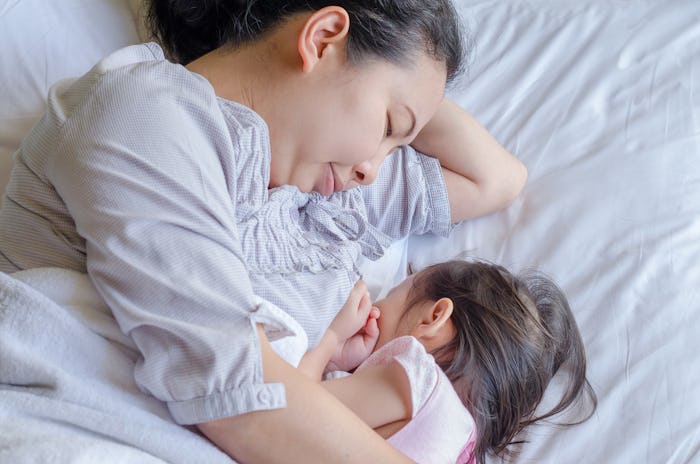Life

5 Breastsleeping Red Flags To Watch Out For
Of all the ways mothers and babies can sleep, breastsleeping is perhaps the most convenient. Just like the name implies, breastsleeping is simply bed sharing with lots of breastfeeding in the mix. Like any sleep method, there are a few breastsleeping red flags to keep an eye out for, but with the proper safety precautions in place, breastsleeping is a straightforward, convenient, and healthy way for mothers and babies to sleep together and get all the rest they need.
According to the man who coined the phrase, James McKenna of the Mother Baby Behavioral Sleep Laboratory, breastsleeping is “bedsharing with breastfeeding in the absence of all known hazardous factors." It relies heavily on a set of “rules” that researchers say will make the sleeping environment as safe as possible. An article from MedScape noted that breastsleeping seems to contradict many of the American Academy of Pediatrics’ guidelines for safe infant sleep. However, it also states, that a large majority of parents admit to breastsleeping anyway, believing it can be (and usually is) done safely.
The article goes on to say that parents will continue to breastsleep, and so knowing how to do it safely is key to having a healthy, restful sleep situation. Ensuring the absence of all of these red flags will keep your child safe, and both of you well-rested.
One Or Both Parents Smoke Cigarettes
Cigarettes are a known risk factor of sudden infant death syndrome. According to the SIDS Network, although researchers don’t directly know the cause of SIDS, they do know that cigarette smoke both during pregnancy and after birth, directly raises the risk of SIDS. Eliminating it from your home entirely is the safest way to ensure it doesn’t impact your baby, especially if you plan to breastsleep.
One Or Both Parents Have Been Drinking Or Using Any Drugs
Like smoking cigarettes, any drug or alcohol use by either parent sleeping in bed with baby raises the risk of SIDS. The Medscape article cited above noted that any drug or alcohol use can impair a parent’s ability to arouse and make them less sensitive to the baby sleeping next to them. The same holds true for medications or prescriptions that can make you drowsy.
There Is A Sibling In The Bed, Too
The University of Notre Dame (home to the Mother Baby Behavioral Sleep Laboratory disussed above) noted that having an infant under 12 months sleeping in bed with another sibling or child, or another non-parent, is unsafe.
The Mattress Is Too Soft Or There Are Too Many Pillows
Breastsleeping mattresses should be firm, non-pillow top mattresses, with lightweight blankets and one pillow for each parent only. Similarly, Dr. Sears noted that there should be no crevices or gaps where the baby could fall.
Mom Isn't Breastfeeding
Obviously, since breastsleeping is the focus here, it’s assumed that the mother will be breastfeeding her child at night. The absence of breastfeeding, though, may make bedsharing with your baby less safe, so it’s a point worth making. LLLI noted that breastfeeding changes a moms “wiring,” increasing the mother/baby bonding, and plays a role in making the mother more responsive to the baby’s needs at night than a non-breastfeeding mom might be.